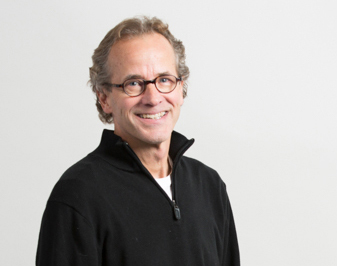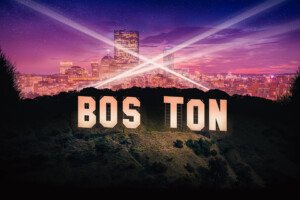Q&A with Black Mass Co-Author Dick Lehr

Photo courtesy Dick Lehr/BU
The official trailer for Black Mass was finally released in May, complete with a menacing Johnny Depp as gangster Whitey Bulger, a swaggering Joel Edgerton as disgraced FBI agent John Connolly, and a cameo by Boston University’s marching band, all set to music by Rick Ross.
The movie, slated for a September 18 release, is based on the book of the same name, published in 2000 and written by former Boston Globe reporters Dick Lehr and Gerard O’Neill. The book gives an intimate, chilling look inside the Boston FBI’s corrupt relationship with the Southie mob boss, based on the pair’s years of reporting at the Globe.
We recently caught up with Lehr, now a professor at Boston University’s College of Communication, who discussed what Bulger himself would think of the film, what it was like inside Triple O’s, and his small cameo near the movie’s climax.
When did you first learn that Black Mass would become a movie?
Black Mass the movie is one of those legendary Hollywood stories where it’s been on again, off again, on again, off again, on again, off again for almost 10 years, so there’s no easy, straight answer to that. Right when the book came out in 2000, even before it came out, the movie rights had been optioned by Harvey Weinstein and his Miramax company. He had in mind Ben Affleck and Matt Damon, who were just coming off their breakthrough movie. That was all pretty exciting, but that was 15 years ago now and nothing ever came of it, and no one knows why. It went through several different producers’ hands through option and development. There was a director named Robert Greenwald who had it for a couple of years, and he was going to do a four-hour cable TV movie, and that never happened.
Then along came Brian Oliver, who was the producer and made [Black Mass] along with Warner Brothers. I think it was 2005 or 2006 when he picked up the option. At the time, he was a Berkeley grad, an attorney, and he’s in the film business, but it was not like he was a rainmaker.
He hired a guy to develop the script, but it took him 10 years to make the movie. It’s all about [Oliver] and his determination to turn Black Mass the book into a movie. The breakthrough from him was he produced Black Swan. His own career opened up in a big way a few years ago, and he created a company called Cross Creek Pictures. Black Swan made a ton of money, a lot of critical acclaim, along with The Ides of March, the George Clooney movie, so he’s become, in the last five years, a pretty major Hollywood player. And he always had Black Mass, and he never forgot Black Mass, and he finally put that deal together in the last few years.
Did you always plan for Black Mass to be made into a movie? The writing and pacing is so cinematic at times, it almost appears that way.
No, I think that’s just the nature of narrative nonfiction. You try to write scenes—scene after scene after scene. I think [in] all my books, I try to do that.
Is there a scene from the book you’re especially interested in seeing translated to the big screen?
Oh gosh. I have actually seen the movie, so now everything is blurring together. No, I think the main thing that I wanted from Black Mass is the black mass—which is the Whitey-FBI partnership, the unholy alliance—to be captured, and to be authentic. And that’s certainly what I watched when I went to New York the other week to see it.
And what did you think of it?
I thought it was really good.
Who else other than Johnny Depp would have made a good Whitey Bulger?
Well—and this goes back—the other actor that we always liked and talked about was Ed Harris. There is an uncanny resemblance. I think Ed Harris would’ve been good.
To what degree have you been involved in the movie?
During the screenwriting process and the development of the script—which went through many drafts, which is typical—Gerry and I were consulted, and available for consulting, and did consult. Once they were here in Boston, a year ago now, for 10 weeks filming, both of us [consulted] at different times—I was down at the set once or twice a week. And while it wasn’t a formal consulting kind of situation, whenever we were there, we ended up being consulted, it seemed. We had some story meetings with the director and a couple with Johnny Depp about the scene they were doing or whatever.
Did you ever visit the Triple O’s in Southie during its heyday?
Oh yeah. [laughs] Yeah.
What did you order?
A beer, a draught.
What do you remember about it?
I just remember not feeling very welcome. No one knew who we were, and I think that’s why we were unwelcome, because no one knew who we were. No one recognized us, and we were outsiders, and who knew what that meant? So there was a bit of a chill—I’ll never forget that—in the place.
How did you react to Bulger’s capture in 2011?
It was just, “Oh my God. Finally. Oh my God.” I picked it up in an old-fashioned way. My wife and I don’t have a phone in our bedroom, and so I got up that morning and went out to get the morning paper, the Globe, and there it was, screaming across the front page. And I just stood there thinking, “Oh my God.”
Then I went into the kitchen, where we have a phone, and there were, like, 15 messages backed up, starting at 1 a.m.—calls from local radio and TV, looking for comment. Had we a phone in the bedroom, I would’ve woken up in the middle of the night with the news. But it was more the morning paper.
What would Bulger think of your book and the movie?
He would dismiss it, and condemn it, and deny it, because it’s a book that reveals his informant life for the FBI. One of his primary claims in his racketeering and murder trial was that he was never an informant, so there’s no way I think he could like it.
Black Mass so deftly captures an old Boston that seems to have disappeared. Is Bulger’s Boston gone altogether?
I wouldn’t say it’s gone. It’s largely diminished, because Southie has changed so much. It used to be an extremely insular neighborhood, almost entirely Irish-Catholic. But now it’s not. It’s home to a lot of young professionals and whatnot, and the whole Seaport District. But there are still plenty of nooks and crannies of old Boston and old Southie, just as there are in Charlestown. It’s not prevailing and not dominant, so that you can, I think, spend a day in Southie and not see it, whereas 20 years ago or something, you couldn’t miss it if you went into Southie.
Is Tiger, the tabby cat that led to Bulger’s capture, included in the movie? Or can you not give that up?
You know, it’s not included. Black Mass focuses on the FBI and Bulger, the two decades of their involvement. So it’s not like our sequel that we wrote, Whitey the biography, which they used a lot of because that gets into Whitey’s whole development and life story. But it’s not like a biopic, in that sense. It focuses on the FBI relationship and the corruption. So the ending—Whitey on the run, Whitey the fugitive, “Charlie Gasko,” his capture—that becomes part of an epilogue. Otherwise it would go on for 10 hours. [laughs] It would just keep going.
Is your chance encounter with FBI agent John Connolly included in the movie? And if so, did you have a hand in who played you?
No, it didn’t make it. There is a different scene, where Gerry and I meet the FBI agent John Morris. They have a couple of actors who play us, and the director put us in the next table in the restaurant. And I honestly don’t remember the actors’ names. They were some local guys. They didn’t allow us to play ourselves.


